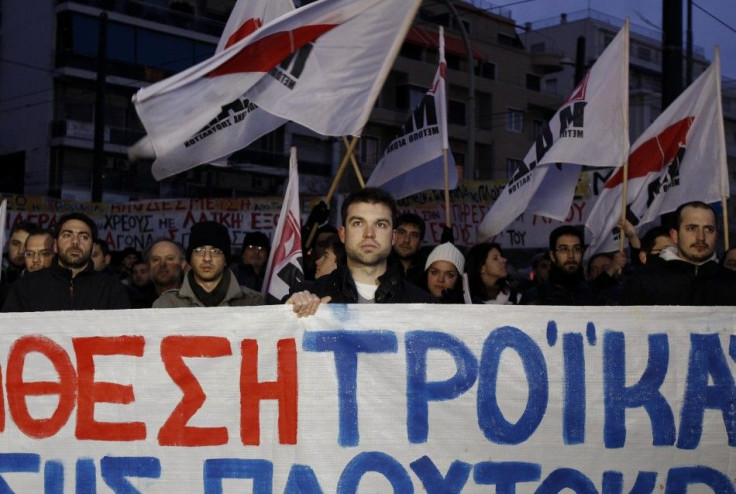Greece Bailout Plan Details Disdained In Brussels, at Home

Hours after Greece's ruling coalition announced Thursday that it had concluded an 11th-hour agreement on new austerity measures in an effort to satisfy foreign lenders, it seemed that everyone - from creditors abroad to political allies back home - was turning on the Greek leadership.
After wee-hour drama that included early morning phone calls between the Greek prime minister and the leader of an allied coalition party, Greece's political leadership showed up in Brussels Thursday morning with more or less what it had been asked to bring: a bailout plan that would allow it to accept further budget cuts and tax increases in exchange for a desperate needed €130 billion.
But at the meeting of the eurozone finance ministers discussing the Greek bailout, the mood was skeptical of the accomplishment.
It's up to the Greek government to provide concrete actions through legislation and other actions to convince its European partners that a second program can be made to work, EU Economic and Monetary Affairs Commissioner Olli Rehn said, suggesting the proposed framework was not enough, and adding he would thoroughly scrutinize the specifics of the deal Thursday night.
German Finance Minister Wolfgang Schaeuble went even further, criticizing the Greek leadership for not having fully implemented the requirements imposed during the first bailout.
Greece has to implement what it has not implemented from the first program before we can decide on a second, he said, later telling reporters who were eagerly waiting for any official pronouncements: You don't need to wait around, because there will be no decision.
Luxembourg Prime Minister Jean-Claude Juncker echoed that sentiment, saying, I do not have reasons to believe that there will be a definitive deal this evening.
And indeed, as of 10 p.m. Brussels time, there was no deal, in spite of pleas from Greek Finance Minister Evangelos Venizelos, who noted we need now the political endorsement of the Eurogroup for the final steps.
Trouble at home
The cool, passive-aggressive reception the Greeks received in Brussels added to the bind that country's leadership is facing for agreeing to further austerity measures. The first set of austerity reforms are widely seen in Greece as contributing to a worsening of the recession there.
Greece's unemployment rate was an astonishing 20.9 percent in November, according to data released Thursday, as roughly one in 11 employed Greeks lost their job during that month. The economic picture is believed to have worsened further since then. The unemployment rate for people 15 to 24 hovers near 50 percent, a fact that some believe could lead to civil unrest. And 91 percent of Greeks interviewed in a recent poll for an Athens newspaper believe their country is going in the wrong direction.
The main reasons behind this deterioration - which is expected to continue until the first quarter of the year at least - are the increased uncertainty over Greek economy's prospects, the prospect of additional austerity and a possible increase in the grey economy, Nikos Magginas, of local National Bank, told Reuters.
Thursday, as the country's main labor unions prepared for a 48-hour strike set to begin Friday morning, a deputy labor minister, Yannis Koutsoukos, resigned, stating the new austerity package would be painful for working people.
Muted market response
Surprisingly, while market analysts have noted that several stock market slumps over the past month have been directly attributable to uncertainty in Greece, the firming up of a bailout deal did not have the opposite effect on U.S. equities.
There's nothing really to be gained for the U.S. stock market as a result of the agreement, Andrew Wilkinson, chief economic strategist at Miller Tabak, in New York told CNBC. It just removes further impediments and reduces the overall risk emanating from the eurozone.
The market responses that did come were mainly from Ireland and Italy, where politicians are using the impending Greek deal to leverage better terms on their own stances vis á vis any future international assistance packages.
Enda Kenny, the Irish prime minister, is fighting for more favorable terms in a restructuring of Irish banks' debt that must happen before March. In comments Wednesday and Thursday, Kenny seemed to be reminding the international community that Ireland, which arguably took more painful financial measures than Greece by pledging to pay all its current obligations, should be rewarded for sticking to the plan.
We take one problem off the table for the moment, Carl B. Weinberg, chief economist at High Frequency Economic, told The New York Times. The Pandora's box has been opened for Ireland and Portugal. We don't know where this goes.
Friends in Washington
The one word of encouragement to the embattled Greek leadership came from Italian Prime Minister Mario Monti, in Washington for an economics conference, who said that even with a minimum of compliance, Greece should be awarded the much-needed bailout.
This is the moment to consider if there if is a minimum of compliance on the requirements [...] to turn the page, Monti said at a Peterson Institute for International Economics event, according to Reuters. The strict adherence to a model might prevent a pragmatic solution of the problem.
© Copyright IBTimes 2024. All rights reserved.




















